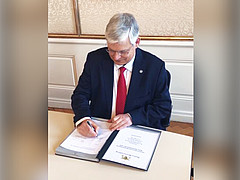On-campus or digital:
University of Hohenheim prepares for teaching in the summer semester [02.04.20]
Special session of the Senate discusses strategies for different teaching scenarios / Higher education funding agreement provides prospects for working even after the crisis
Since the first day of the closure of its on-campus activities, the University of Hohenheim has been preparing to resume teaching in the summer semester. This could be implemented both in a limited on-campus form as well as using digital forms of study, the Senate confirmed at its meeting on Wednesday, 31 March 2020. In addition, the Senate called on the state to create uniform regulations for various existing legal uncertainties as soon as possible and to support the universities in the particular difficulties caused by digitalization and other effects of the coronavirus crisis. At the same time, the Senate acknowledged today's conclusion of the higher education funding agreement: The state thereby gives its universities the prospect of maintaining their ability to work after the coronaviris crisis has been overcome.
Hohenheim students, lecturers, didactic experts, IT specialists, management - they are all doing an outstanding job in an unprecedented situation in order to create the best possible study conditions for the coming summer semester, emphasized the Chair of the Senate, Prof. Dr. Stephan Dabbert.
These conditions will also be ensured even if the measures to combat the pandemic allow for no or only a limited presence on campus. In this case, the University is preparing to convert the course content to digital offers. At the heart of the strategy is a service portal that supports lecturers during the transition. This includes technical and didactic aids, telephone advising, or logistical support in order to start courses.
To ensure sufficient server capacity for up to 10,000 students studying at home, courses should be transmitted asynchronously, i.e. without live streaming. For final theses to be written even when laboratory operations are limited, more topics are to be assigned which, for example, evaluate data already collected.
"In spite of all our creativity and flexibility, a good measure of uncertainty naturally remains because we depend on conditions that we cannot foresee or influence," emphasized the President. "I would like to thank the Task Force and its chairperson, Vice President Prof. Dr. Korinna Huber, for their exceptional work!”
Appeal to the state for support
For the University of Hohenheim, this is a tour de force with many demands, including financial ones: In order to react quickly and in the interest of teaching and research, the university management has made considerable funds available at very short notice for IT infrastructure, health safety measures, or staffing shortages.
The Senate also viewed existing uncertainties about the dates for the Abitur and semesters as well as legal issues as important topics. The University of Hohenheim is therefore taking part in the joint Task Force on Study Organization (“Studienbetrieb”) made up of all state universities and hopes that the state will quickly clarify any open questions regarding admission requirements, semester dates, or support for international students.
Higher education funding agreement offers stability in uncertain times
In view of the exceptional situation in which the state currently finds itself, the President considered it a signal of confidence that the state government had announced that it would sign the higher education funding agreement for the years 2021 to 2025 regardless of the coronavirus crisis.
Last summer, the Senate of the University of Hohenheim, among others, called on the state to improve the basic funding for higher education institutions on a sustainable basis. The demands included a future inflation compensation of 3% annually and an additional increase in the basic financing of 1,000 euros per student.
The higher education funding agreement is intended to ensure the basic funding of the universities. The annual growth rate of 3% has been achieved - a particularly important element, explained Prof. Dr. Dabbert: "The agreement, which the universities and the state government are now countersigning, is a very complex set of rules. The effect of the welcome additional funds at the state level is counteracted by developments at the federal and EU levels. The loss of federal funding from the Quality Pact for Teaching, the planned sales tax reform, e-invoices, and increasingly complex public procurement laws are, for example, topics that will foreseeably burden the budget of the University of Hohenheim with millions of euros"
What the university management particularly welcomes is the reliable basis offered by the agreement. "We are thus maintaining our ability to work and can now concentrate on restoring the University's operations, which have been restricted by coronavirus in terms of study and teaching, as comprehensively as possible over the next few months and in part in a new way," explained the President.
He thanked not only the state, but also the many university members and especially the students, who repeatedly and emphatically campaigned with demonstrations and other actions to ensure that there would continue to be good conditions for research and teaching at universities in the future. The universities' contribution to the innovative capabilities and future viability of Baden-Württemberg must continue to be given adequate consideration in university funding in the coming years.
Text: Klebs


